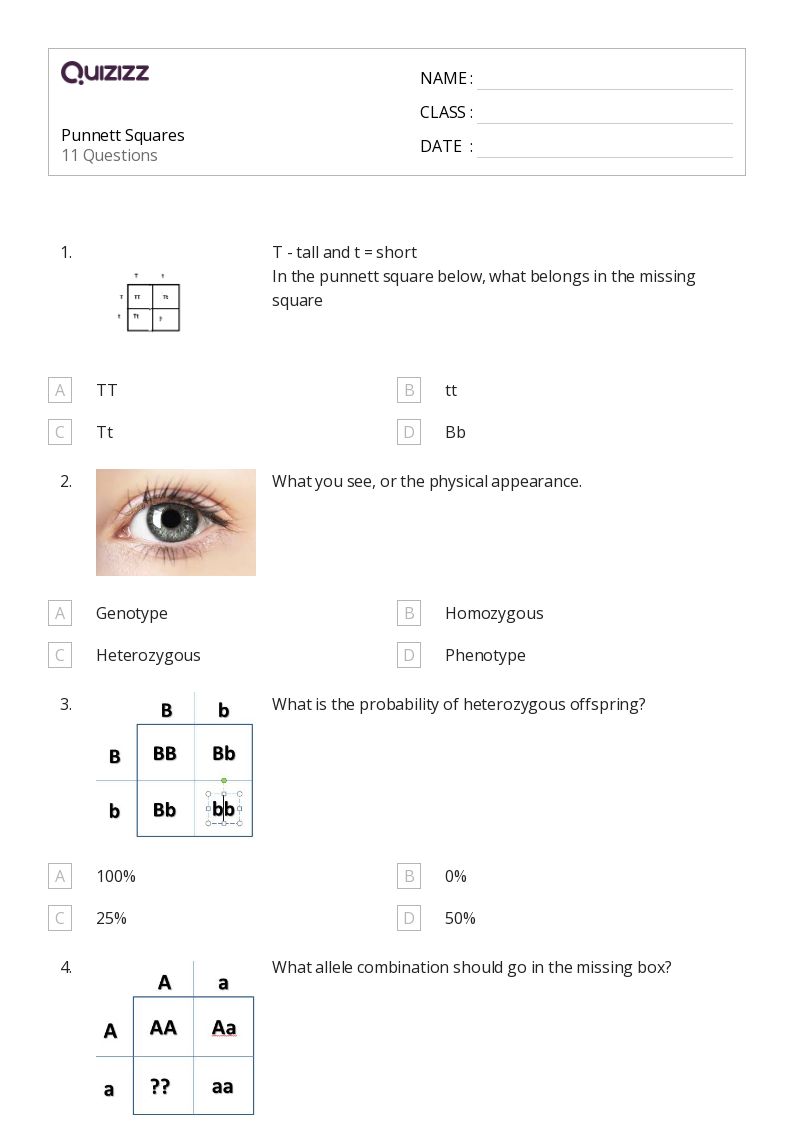Punnett Squares Practice Worksheet
Punnett Squares Practice Worksheet - Make a punnett square to determine the possible offspring. What are percentages of each offspring? To complete the worksheet, students will need a. A worksheet for students to learn and apply mendelian inheritance and punnett squares with dog traits from mutt mixer. The possible combinations you could get would be dominant tall (tt), hybrid tall (tt), and recessive. Make a punnett square for the cross you modeled earlier, between two furnished (ff) dog parents.
The offspring must be one of these genotypes listed in the squares. A worksheet for students to learn and apply mendelian inheritance and punnett squares with dog traits from mutt mixer. The punnett square show us the various possibilities during fertilization. Practice using a punnett square to determine genotype and phenotype probabilities when the genotype of the parents are known. 11) in each case, what percentage/how many of the offspring would be expected to be hearing?
This punnett square practice worksheet follows mendelian rules, and is appropriate for middle school students, freshman, or sophomores. What are percentages of each offspring? Complete each punnett square and answer the questions. Make a punnett square for the cross you modeled earlier, between two furnished (ff) dog parents. Fill in the genotypes and phenotypes for all the possible offspring.
This punnett square practice worksheet follows mendelian rules, and is appropriate for middle school students, freshman, or sophomores. What are the possible genotypes of the offspring? Practice problems, featuring traits from the mutt mixer interactive, give students a chance to apply each. In an individual with a heterozygous genotype, the dominant allele. List the parent genotypes, draw and fill in.
Practice using a punnett square to determine genotype and phenotype probabilities when the genotype of the parents are known. Practice problems, featuring traits from the mutt mixer interactive, give students a chance to apply each. In an individual with a heterozygous genotype, the dominant allele. List the parent genotypes, draw and fill in a punnett square, and then list the.
The offspring must be one of these genotypes listed in the squares. Includes practice problems, explanations, and quiz questions. The possible combinations you could get would be dominant tall (tt), hybrid tall (tt), and recessive. A worksheet for students to learn and apply mendelian inheritance and punnett squares with dog traits from mutt mixer. Up to 24% cash back punnett.
Fill in these two punnett squares to illustrate the crosses for your possible male genotypes (from question 9) with the deaf female dog. This punnett square practice worksheet follows mendelian rules, and is appropriate for middle school students, freshman, or sophomores. Punnett squares practice most genetic traits have a stronger, dominant allele and a weaker, recessive allele. What are the.
Punnett Squares Practice Worksheet - What are the possible genotypes of the offspring? This punnett square practice worksheet follows mendelian rules, and is appropriate for middle school students, freshman, or sophomores. Practice using a punnett square to determine genotype and phenotype probabilities when the genotype of the parents are known. Up to 24% cash back use a punnett squares to illustrate the two possible crosses. A homozygous dominant brown mouse is crossed with a heterozygous. The possible combinations you could get would be dominant tall (tt), hybrid tall (tt), and recessive.
What are percentages of each offspring? Make a punnett square for the cross you modeled earlier, between two furnished (ff) dog parents. This punnett square practice worksheet follows mendelian rules, and is appropriate for middle school students, freshman, or sophomores. What are the possible phenotypes of the offspring? Make a punnett square to determine the possible offspring.
The Offspring Must Be One Of These Genotypes Listed In The Squares.
The possible combinations you could get would be dominant tall (tt), hybrid tall (tt), and recessive. During fertilization sperm meets the egg. Punnett squares practice most genetic traits have a stronger, dominant allele and a weaker, recessive allele. Fill in these two punnett squares to illustrate the crosses for your possible male genotypes (from question 9) with the deaf female dog.
This Worksheet Covers The Basics Of Mendelian Inheritance And Punnett Squares.
Fill in the genotypes and phenotypes for all the possible offspring. Up to 24% cash back use a punnett squares to illustrate the two possible crosses. A worksheet for students to learn and apply mendelian inheritance and punnett squares with dog traits from mutt mixer. 9) explain how could you tell the genotype of gilbert’s.
Punnett Square Practice Worksheet With Answers:
Make a punnett square for the cross you modeled earlier, between two furnished (ff) dog parents. Up to 24% cash back using a punnett square, determine the genotypic and phenotypic probabilities for their potential offspring. Practice problems, featuring traits from the mutt mixer interactive, give students a chance to apply each. What are the possible genotypes of the offspring?
List The Parent Genotypes, Draw And Fill In A Punnett Square, And Then List The Offspring Genotypes And Phenotypes.
What are the possible phenotypes of the offspring? Up to 24% cash back punnett square practice pages. A homozygous dominant brown mouse is crossed with a heterozygous. Up to 24% cash back use a punnett square to predict the most likely phenotypic ratio and genotypic ratio of their possible puppies.




